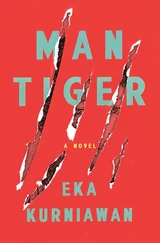None of these efforts were helping, and Kliwon himself knew it. He had been cursed to suffer, and only the love of that little girl could possibly cure him. He wished he could kidnap her, carry her away to some secret place, maybe to the middle of the jungle. They could live together in a cave or in a valley and herd wild goats. He would take care of her himself, watch over her and tend to her needs, and raise her up into a young lady until the time came when he could win her love. He left his friends and once again waited for the little girl in front of her house every morning. The child was surprised to see him reappear after being gone for so long, and asked him, “How are you? I heard you were sick.”
“Yeah, I’m sick with love.”
“Is love like some kind of malaria?”
“Worse.”
Alamanda shuddered, and then leading her little sister, she took off walking toward the school. Kliwon followed and walked next to her miserably, before he finally spoke.
“Listen up, little girl,” he said. “Do you want to love me?”
Alamanda stopped and looked at him, and then shook her head.
“Why not?” asked Kliwon, disappointed.
“You yourself just said that love is worse than malaria.” Alamanda once again took her little sister’s hand and continued walking. For the second time she left Kliwon, who promptly collapsed in another fever and an even more excruciating suffering.
When Kliwon was thirteen, an old man had come to their house with a weird request: “Let me die here.” His mother could not refuse such a request, so she invited him in and offered him a drink. Kliwon didn’t know how the man would die inside their house; maybe he would die of hunger, because it looked like he hadn’t eaten for days. But when his mother invited the man to eat, he ate so ravenously that it seemed as if he wasn’t really ready to die. He ate everything put in front of him, even gnawing on the fish bones, leaving not a scrap behind. He let out a satisfied belch and then opened his mouth again to ask, “Where is Comrade?”
“He was shot dead by the Japanese,” replied his mother tersely.
“And that kid,” asked the guest, “that’s the child you had with him?”
“Of course,” replied his mother, still a little curt, “I certainly didn’t have him with a wild pig.”
The guest was named Salim. Even though Mina did not seem pleased by the man’s arrival, the guest insisted on staying with them. “I can stay in the bathroom and eat only bran porridge fit for the chickens, as long as you please let me die here.”
Kliwon tried to convince his mother that it was better to let the man die in their house than in a drainage ditch. Finally Salim was given the front room, a guest room that had never been used, and Kliwon promised he would keep bringing him food until the moment he died.
He was not a vagabond. As soon as he took off his shoes Kliwon could see that the skin on his feet was covered in blisters.
“Are you a fugitive?” asked Kliwon.
“Yeah, tomorrow they are coming to execute me.”
“Why? Did you steal something from someone?”
“From the Republic of Indonesia.”
This exchange led them into a friendship. Salim even gave the kid his short-brimmed cap, saying that he had gotten it when he was still back in Russia, and explaining that all the Russian workers wore a cap just like that one. He had visited many countries, he said, ever since 1926.
“But it wasn’t like you were on vacation,” said Kliwon.
“You’re right, I was a fugitive.”
“Who did you steal from that time?”
“The Dutch East Indies.”
The man was a rebel and a communist, an old-time kind of communist, one of the few people who had gotten their ideas directly from the Dutch communist named Sneevliet, and his nickname was Comrade Salim. He admitted that he knew Semaun well and had been a member of the Indonesian Communist Party ever since its inception. When they were in Semarang he had even brought warm milk to Tan Malaka, who was sick with tuberculosis, every morning. The Partai Komunis Indonesia , the PKI, was the first organization to use the name Indonesia, he said with pride. And, he added, it was the first to resist the colonial government. But the Dutch Indies administration had hated them, even before they rebelled. Sneevliet had been banished in 1919, and his compatriot Semaun was exiled four years later, one year after Tan Malaka. Other figures, including himself, packed their bags and prepared to be exiled or thrown in prison.
As it turned out, the colonial government decided to capture him in the month of January, 1926. Apparently they had heard about the stirrings of revolution, which had been discussed in Prambanan a month before. Salim was never thrown in prison, because he managed to escaped to Singapore along with some others. That was the first time he went wandering, even though he was not a wanderer.
“If someone says he is a communist but has no intention to rebel,” he said to Kliwon, “don’t believe he’s really a communist.”
He lay on top of the bed in a weird way: stark naked. He took off all of his dirty garments that stank of mud, and even though Kliwon generously offered to lend him his father’s old clothes, Salim refused. At first Kliwon felt awkward but after a while he sat on the chair near the door, facing the bare old man as comfortably as he could.
“I want to die with nothing,” said Comrade Salim. “I am afraid they are going to shoot me before I wake up.”
“If that’s how you feel, don’t go to sleep,” said Kliwon. “Once you are dead you can sleep for as long as you want. Forever.”
It was true. So the man tried to keep his eyes open even though Kliwon knew he must be exhausted. To make sure he didn’t fall asleep, Comrade Salim talked continuously, sometimes rambling incoherently, and sometimes sounding as if he were reciting a lamentation. Kliwon thought he was delirious. He said that he was very close with the president of the republic. They used to live in the same quarters in Surabaya, they studied under the same teacher, and sometimes they fell in love with the same woman. And later, when he came home for the first time after running away and spending a long time in Moscow, he had reunited with the president. They had embraced, their eyes welling up with tears of joy.
“Maybe you don’t believe me now, but at some point you’ll read all about it in the newspapers,” he said. “And yet, now that very same man is sending soldiers to murder me.”
“Why?” asked Kliwon.
“That’s what happens when you steal something that belongs to someone else,” replied Comrade Salim.
“Who else have you stolen from?”
“I already told you: the Republic of Indonesia.”
Hesitation, he said, was the source of the Communist Party’s failed revolution in 1926. He met with Tan Malaka in Singapore, after his first escape, to discuss their strategy. Tan Malaka strongly opposed the idea of revolution, because he felt the communists weren’t ready. So he went to Moscow to get the input of the Comintern, but the Comintern forbade it even more vehemently.
“I was held by Stalin for three months,” said Comrade Salim, “to be de-reindoctrinated.”
But the idea of revolution had already filled his head. After he was allowed to leave Moscow, he returned to Singapore intending to carry it out — even if no one else supported him, even if he had to do it guerrilla-style. But it turned out that revolution had already erupted, and had failed. The colonial government had forced the Party to disband, and all of its activities were forbidden. Most of its organizers were imprisoned, if not thrown into Boven-Digoel. What was even more frustrating was that the Comintern now supported the revolution, but it was a joke that came a little too late.
Читать дальше











